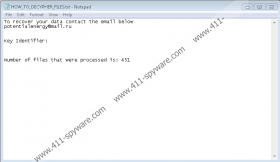Energy Ransomware Removal Guide
When Energy Ransomware encrypts files, it attaches the “.energy[potentialenergy@mail.ru]” extension to their original names. This extension is like a flag that indicates which files were hit. Unfortunately, you are likely to see these flags pinned to some of your most valuable and important files. These could be .JPG, .JPEG, .RAR, .ZIP, .AVI, .XLS, .MP4, .DOC, .MPEG, .WAV, or .MP3 files. The good news is that this malware does not encrypt everything that comes its way. Instead, it specifically encrypts files in the %ALLUSERSPROFILE% and %USERPROFILE% (Desktop, Documents, Pictures) directories. The bad news is that this is where you might keep your most valued files. If that is not the case, and if you can confirm that this malware has not done any great damage, all you need to do is delete Energy Ransomware. However, if important files were encrypted, you might be lost about what it is that you need to do next. Continue reading, and, hopefully, you will learn what to do about the infection and its removal.
The first thing we need to mention is that Energy Ransomware is an extremely clandestine threat. It would not surprise us if you told us that you did not know where this malware came from. Our research team has analyzed tons of file-encrypting infections – including Aieou Ransomware or BlackKingdom Ransomware – and we know that most of them use spam emails and malicious downloaders. In the first scenario, the launcher of the infection is introduced as a document, and the victim is tricked into opening it because of the misleading message. In the second scenario, the launcher is introduced as a harmless file or software installer. If your system has a security system, Energy Ransomware should not be allowed to execute. However, if your system is not secured, this malware can slither in without your notice. After this, it quickly encrypts your files – which renders them unreadable – and then it drops its own text file on the Desktop. This file is named “HOW_TO_DECYPHER_FILES.txt,” and opening it should be fine.
To recover your data contact the email below
potentialenergy@mail.ru
Key Identifier: [unique key]
Number of files that were processed is: [unique number]
This is the message that the text file dropped by Energy Ransomware represents. So, all you have to do is email cybercriminals, and your files will be restored? Of course, that is not the case. If you email them, they will quickly send you instructions on how to pay for a decryptor. We cannot know what kind of a ransom would be demanded from you, but even if the sum is small enough, we do not recommend wasting your money. Unfortunately, if you pay, you are unlikely to get anything in return. Instead of a decryptor, you are likely to receive more intimidating or misleading emails, and your own email address could be leaked for other malicious parties to exploit. Therefore, you even have to think twice before sending a message to potentialenergy@mail.ru. None of this should matter to you if you can replace the encrypted files. You might have copies of your files stored on virtual drives, external drives, or additional devices/computers (including those of your colleagues, family, or friends). Hopefully, you have replacement copies.
If you can replace the encrypted files – which appears to be the only solution at this time – make sure you remove Energy Ransomware first. If you can locate the launcher of this malware, removing it should not be difficult, but we cannot help you identify this file. That is because we cannot know its location or even name. So, what can you do if you cannot delete Energy Ransomware yourself? If that is the case, anti-malware software can be of great help. The automated removal of malicious threats is not the only or even the main reason to install this software. It is most important that it can secure your operating system, and if you have no desire to face ransomware again, you need protection. Of course, even once your system is secured, you cannot let your guard down, and you always want to store copies of important files somewhere safe. Somewhere away from the original files.
How to delete Energy Ransomware
- Check these directories to find and Delete the launcherof the infection:
- %USERPROFILE%\Desktop
- %USERPROFILE%\Downloads
- %TEMP%
- Go to the Desktop and Delete the file named HOW_TO_DECYPHER_FILES.txt.
- Empty Recycle Bin and then immediately scan your system to check for malware leftovers.
Energy Ransomware Screenshots:


